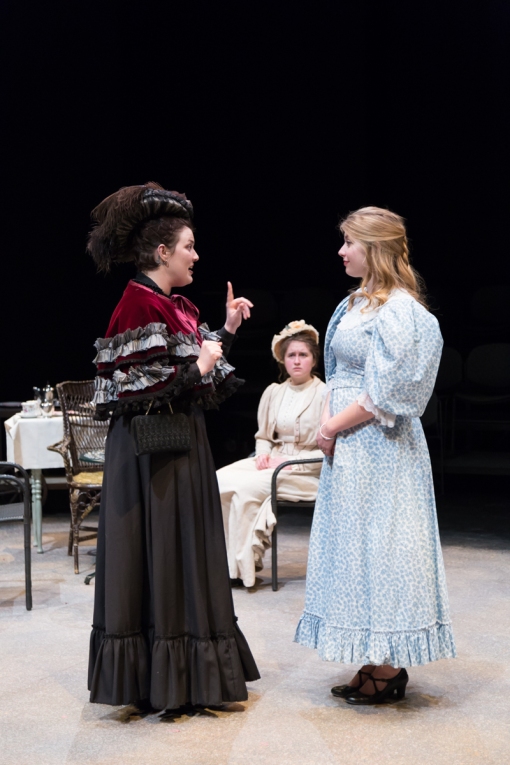by Thomas MacDougall

Satellite théâtre’s Overlap in the Black Box Theatre for NotaBle Acts. Photo credit: Matt Carter
NotaBle Acts’ second Mainstage show of 2019 comes from the city of Moncton. Overlap was written by Céleste Godin, directed by Marc-André Charron, and produced by Satellite théâtre.
At a party spiraling into the night, a group of friends discuss the foibles of their city, its interconnected nature, and the harsh lines of separation between populations and their language. While that is technically the premise, Overlap is embodied by a showman’s personality. It’s a physical theatre piece, with dynamic movement and alluring performer choices recited entirely in French that dips into multiple Acadian dialects and, occasionally, English.
The stage is lit by designer Claire Seyller with a frame of spotlights that ignite and fade as if they were the sparking bulbs on a Broadway marquis. The actors are dressed in sleek black formal attire with accents of red. They interact with the audience like the hosts of a regal casino event. This personality is essential to the show, as much of the dialogue boils down to gripes and paradoxes about their Moncton home. If it weren’t for the tenacity of performance, it would seem like the writer was complaining with no solution.
Yet the solution ends up being the introspection. These figures are drunken partygoers and their critiques of society are framed as questions with no hope of answers, systemic or personal. To solve their problems, they would need to leave the town they so dearly love. Despite the irony of them now performing the show in Fredericton, the message has clearly transcended their region and allows all audiences to be introspective toward their own homes and cultures.
Je suis désoleé. Je ne comprends pas le Français. Credit is due to the company for preparing English surtitles to accompany their show. Even in this bilingual province, it would be a miracle to see the same courtesy extended by an Anglophone show. Moreover, as the intersection between languages, dialects, and culture is a focal point of the performance, the surtitles’ purpose transcends accessibility or pandering. Staying true to its diverse NB audience, Overlap puts in a little extra effort.
Though Overlap features some of the best uses of the Black Box’s projections, having your surtitles displayed far above the action creates a disconnect, and even experience-breaking whiplash. Though one could very likely construe the performers’ meaning from tone and expression alone, Godin’s writing is clever enough (even translated) to warrant a peak upwards for full context.
I struggle with how much of the dialogue is spoken by the entire cast simultaneously. The initial idea for the show described by Charron was to frame Moncton as the Greek concept of “The City.” So one could assume these ‘all together now’ moments are to replicate the methods of the Greek Chorus. However, this removes much of the distinguishing features of each of the performers. Though the show itself has a clear identity and goal, characters with defined characteristics and perspectives on the issues tackled, as in Socratic Dialogue, would certainly help add conflict to a show that perpetually seeks to have us ‘all on the same page’.
Hurdling over the language barrier, Overlap is an easily accessible show with enough charm and camaraderie to make any audience snap to attention. The best love letters in showbiz are the critical ones. I really hope Moncton was listening and is proud of their stars.
NotaBle Acts’ Theatre Festival and Satellite théâtre’s Overlap ran July 26 to 27, 2019 in St. Thomas University’s Black Box Theatre.











